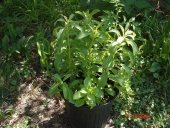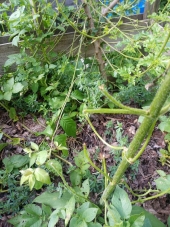




 1
1




Invasive plants are Earth's way of insisting we notice her medicines. Stephen Herrod Buhner
Everyone learns what works by learning what doesn't work. Stephen Herrod Buhner
 4
4




Pecan Media: food forestry and forest garden ebooks
Now available: The Native Persimmon (centennial edition)
 3
3




Dan Boone wrote:I really don't think it matters what plants you eat as long as you *just* eat plants.
 1
1




 1
1




Check out Redhawk's soil series: https://permies.com/wiki/redhawk-soil








Check out Redhawk's soil series: https://permies.com/wiki/redhawk-soil
 1
1








John Saltveit wrote:Jicama too. Mashua?
John S
PDX OR




Kris Mendoza wrote:It's an annual, but BITTER MELON is excellent for diabetics. My next door neighbors are in their 70s and are managing diabetes well. They grow and eat tons of the stuff, and swear to its effectiveness. A quick google showed that there has been a fair amount of research that supports this.
Check out Redhawk's soil series: https://permies.com/wiki/redhawk-soil
 1
1








Check out Redhawk's soil series: https://permies.com/wiki/redhawk-soil
 2
2




Trying to achieve self-reliance on a tiny suburban plot: http://gardenofgaladriel.blogspot.com
 1
1




Medicinal herbs, kitchen herbs, perennial edibles and berries: https://mountainherbs.net/ grown in the Blue Mountains, Australia












G Freden wrote:How about mushrooms?
Invasive plants are Earth's way of insisting we notice her medicines. Stephen Herrod Buhner
Everyone learns what works by learning what doesn't work. Stephen Herrod Buhner
 1
1




 1
1




Check out Redhawk's soil series: https://permies.com/wiki/redhawk-soil

|
Where's our bucket of delicious fishes? Check this tiny ad:
Freaky Cheap Heat - 2 hour movie - HD streaming
https://permies.com/wiki/238453/Freaky-Cheap-Heat-hour-movie
|




